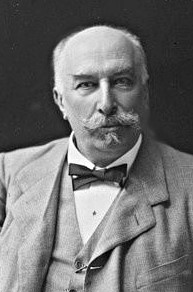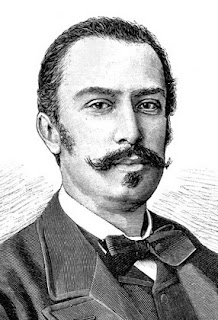Monk who explained how lightning conductors work
The physicist, mathematician and Piarist monk Giovanni Battista Beccaria, whose work with electricity confirmed and expanded upon the discoveries of the American polymath and Founding Father Benjamin Franklin, died in Turin on this day in 1781.
Beccaria was Professor of Physics
at the University of Turin
At the age of 64 he had been ill and in pain for some years but was working right up to his death on a treatise on meteors.
For much of his life, Beccaria had been occupied in the study of electricity with particular focus on the discoveries made by Franklin, with whom he corresponded regularly.
He successfully explained such things as the workings of the Leyden Jar and the Franklin square, two devices in which static electricity could be captured and stored, and why pointed objects could discharge electrified objects at a distance.
He was also able to explain why lightning rods, or lightning conductors, protect a building by providing a path along which electricity generated in the air in the form of lightning can be directed safely to earth.
Beccaria wrote and published a complete treatise on Franklin’s electrical theory, called Dell’ Elettricismo naturale ed artificiale (On Natural and Artificial Electricity) in 1753.
Born in Mondovì, a town in Piedmont about 80km (50 miles) south of Turin in the province of Cuneo, in October, 1716, Beccaria entered the religious Order of the Pious Schools or Piarists at the age of 16.
The Piarists had been founded in 1617 by Spanish priest Joseph Calasanz. It is the oldest religious order in the world dedicated to education. After studying under the order, he taught grammar, rhetoric and mathematics.
 |
| Benjamin Franklin, with whom Beccaria often corresponded |
Beccaria acquired a reputation as an effective teacher but found himself at the centre of controversy in 1748, when he was appointed by royal authority as Professor of Physics at the University of Turin. This was a coveted position and Beccaria was subjected to complaints from rivals that he was not sufficiently qualified for the role.
In response, his sponsors came up with an idea to silence his critics. They had heard about the work of the French physicist, Thomas-François Dalibard, whose experiment at Marly-la-Ville, north of Paris, had demonstrated that lightning was a form of electricity, and urged Beccaria to make this new field his own area of expertise.
Beccaria followed their advice and set about writing and publishing a complete treatise on the electrical theory of Benjamin Franklin, news of whose work with electricity in the United States had reached Europe in 1751. Beccaria’s Dell’ Elettricismo naturale ed artificiale was published only two years later.
Devoting himself to research on atmospheric electricity, Beccaria made use of kites, rockets, and iron wire in conducting his experiments.
Using an early electroscope developed by the English physicist William Henley, Beccaria noted that, in broken or stormy weather, positive and negative electrification were detected, whereas in calm, serene weather, positive dominated. He attributed the forked character of lightning to the resistance of the air and theorised that the spontaneous rupturing of the shoes worn by a man struck by a lightning bolt was the result of the "moisture of the feet flying into vapour".
 |
| The cover page of Beccaria's treatise |
His work confirmed the American’s finding that pointed rods could discharge electricity in the air, which eventually led to such rods being attached to tall buildings for the protection in an electrical storm of individuals on the ground. The King of Sardinia, Charles Emmanuel III, was so impressed that he asked Beccaria to install a lightning rod on the Royal Palace,
In 1755, Beccaria was elected Fellow of the Royal Society of London. His work Dell'elettricismo artificiale e naturale was translated into English in 1778. Franklin described the treatise as “one of the best pieces on the subject in any language.”
Travel tip:
Piazza Maggiore, the main square of the historic
Piedmont town of Mondovì, near Cuneo
The historic town - and ancient city - of Mondovì is located in the Monregalese Hills at the foot of the southern Alps, where the Piedmont and Liguria regions meet. It is built on two levels, the upper being divided into several rioni (ancient quarters). The lower town developed from the 18th century when railway connections saw industries emerge. A funicular railway links the Breo quarter with Piazza, the oldest part of the town. Although the origins of Mondovì date back to the Roman Empire, it flourished during the Middle Ages, occupying a strategic position at the intersection of trade routes between Piedmont and the Mediterranean coast. Piazza was founded around 1198 by the inhabitants of three hamlets, who joined forces to protect their community from outside threats. Nonetheless, the town was seized by the Bishops of Asti, followed by Charles I of Anjou, the Angevins, the Visconti, the Marquisate of Montferrat, the Acaja and, from 1418, the House of Savoy, who would leave an indelible mark on the character and architecture of the town, fortifying its walls and constructing buildings that still stand today. In the mid-16th century, when it was occupied by France, Mondovì was the largest city in Piedmont and the seat of the region’s first university.
Travel tip:
Cuneo's elegant Piazza Galimberti is one of the
largest squares in the whole of Italy
The city of Cuneo, which developed at the confluence of the Stura and Gesso rivers about 28km (17 miles) west of Mondovì, is set out in a grid system with an elegant central square, Piazza Galimberti, one of the largest squares in Italy, after Piazza del Plebiscito in Naples. Surrounded by neo-classical buildings, it has a large statue of Giuseppe Barbaroux, the author of the Albertine Statute that formed the constitution of the Kingdom of Sardinia-Piedmont in 1848. The square is named after Duccio Galimberti, one of the heroes of the Italian resistance in the Second World War. Cuneo had been acquired by the Duchy of Savoy in 1382 and remained an important stronghold of the Savoy state for many centuries. Cuneo is the home of a chocolate confection called Cuneesi al rhum - small meringues with dark chocolate coating and a rum-based chocolate filling. They were the creation of Andrea Arione, whose bar and pasticceria, Caffè Arione, is still located in Piazza Galimberti.
Also on this day:
1508: The death of da Vinci painting subject Lucrezia Crivelli
1944: The birth of television journalist Bruno Vespa
1956: The birth of screenwriter and director Giuseppe Tornatore



.jpg)